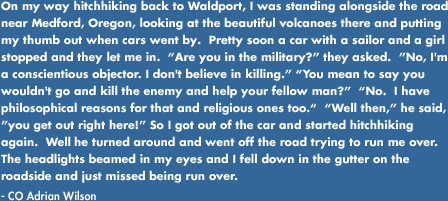|
The vast majority of Americans supported World War II after Pearl Harbor was bombed, recognizing a fascist threat to Western democracy. Over the years, it has come to be known as "the good war," a term that refers to the rare sense of unity that characterized America during the war years. But even in that extreme case of "good" versus "evil," there were men whose religious, ethical and political principles did not allow them to participate in killing other human beings. These conscientious objectors included both religious and secular objectors.
Religious objectors were mostly members of the traditional peace churches, Quakers, Mennonites and Brethren. Some Muslims, Catholics, Jews and others were also COs, as well as Jehovah's Witnesses. Secular objectors acted from various political, philosophical, ethical and humanitarian principles. Like combat soldiers, many conscientious objectors were willing to sacrifice themselves for their country. However, they were simply unwilling to kill for it.
WWII was the bloodiest conflict in human history. Thirty-five to 60 million people lost their lives on three continents. Conscientious objectors were outcasts in a world convinced of the necessity, the inevitability and the glory of war. Taking a stand against the popular war could mean being ostracized by society, by family, friends, in the workplace and often in the small towns near Civilian Public Service (CPS) camps.
Many local residents resented having CPS camps in their area. The Lincoln County Times in Oregon printed an editorial asking:
So why are these conscientious objectors with the jitterbug complex allowed to go out, drink and publicly flount [sic] their draft status in front of hundreds of people who have dear ones in the Uniform of These United States?
CO Martin Ponch was trained as a firefighter at CPS camp in New Hampshire:
We woke up one morning to find out Plymouth had burned down and they never called the men from the camp... They were willing to let 1/3 of their town burn down rather than let those damn COs come out.
Louise Brown's husband was in San Dimas CPS camp in Southern California:
When I looked for jobs they'd ask what my husband did and I'd say he was a CO. I was literally cursed and kicked out the door. I learned to say my husband worked for the Forest Service.
|

